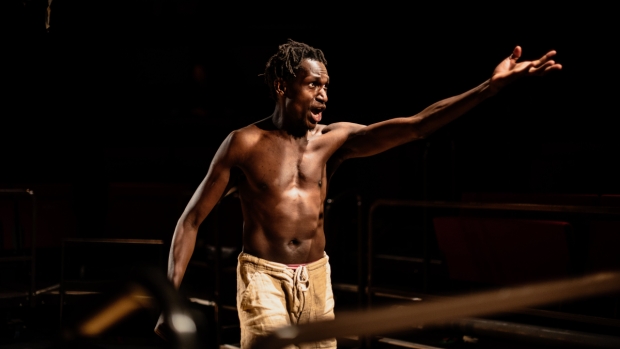Far Gone at Sheffield Crucible Studio – review
John Rwothomack’s solo show concludes its run this Saturday, 26 February, before heading out on tour

© Leon Ngeleka
As the audience enters the Crucible's Studio space, a very large little boy is playing. He gets various audience members to play with him, taking an infectious pleasure in their efforts, then, when the time comes, slides effortlessly into the play proper.
He is captured by the Lord's Resistance Army and, as the play goes on, the terrified little boy adjusts more and more successfully to the demands of the LRA. John Rwothomack, the sole actor in this piece, takes on the roles of the other characters, notably the preening LRA commander whose manner irresistibly reminds us of Idi Amin. Finally, as the child soldier kills another to cement his position in the LRA, he is brought up against the evil of his position.
John Rwothomack, as a child in Uganda, narrowly escaped the fate of the boy in his play. Now he has built a play, 70 interval-free minutes, around the incident. Originally staged at Sheffield's Theatre Deli in 2019, it was about to embark on a tour the following year when the lockdown took effect. Two years later, it has settled into a run at the Studio Theatre before heading out to Yorkshire and Lancashire.
Mojisola Elufowoju's direction is bold, using the in-the-round space superbly, almost bursting out into the audience, her confidence in the ability of the audience to respond total. The set may be simple – only fronds hanging above the stage – but the sound is exceptional: music and effects blended into a telling mixture.
However, the play stands or falls by Rwothomack. As a writer he creates problems for himself as an actor: the play is not really balanced, the early days after his capture predominate, the later passage of years over in a few minutes. And, above all, the play leaves gaps that need filling by his remarkable performance.
This is where Rwothomack excels. A friendly face from the start, he involves the audience in his games. He mimes both sides in his childhood games, including being knocked head over heels. He shifts character effortlessly from the small boy to the self-regarding commandant to his ape-like lieutenant to the ghost of his uncle, his movements and stance as important as the words. His piping treble as the child-narrator should have irritated, but somehow the conviction of the whole performance is irresistible.
The whole play disarms criticism. The programme sales with a donation to North Ugandan charities reminds us that we can easily forget that women and children are still suffering the after-effects of persecution and civil war – and the programme itself tells the story of Ugandan charities. It also tells of the play's visit to Uganda in 2019.
In 2022, Far Gone holds up well as it sets out on tour.












